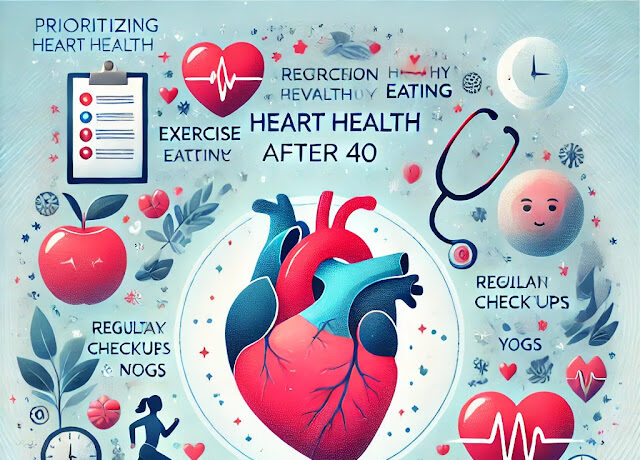Prioritizing Heart Health After 40: Prevention and Care
Rising Heart Risks Among the 40+ Age Group
Karnataka, Mangalore: India’s workforce, particularly those around the age of 40, plays a crucial role in supporting families and driving the nation’s economy. However, this stage of life also brings an increased risk of heart attacks and cardiovascular diseases. As heart-related conditions become more common, taking preventive measures and adopting a heart-healthy lifestyle is essential.
Understanding Heart Disease and Its Causes
A heart attack occurs when blood flow to the heart is blocked, often due to coronary artery disease. This can lead to sudden and severe health complications, disrupting daily life. Identifying the early signs and risk factors can significantly improve prevention and management.
Key Risk Factors After 40
- Aging: As arteries harden with age, blood pressure tends to rise, increasing the risk of heart disease.
- Lifestyle Choices: A sedentary job, lack of exercise, unhealthy eating habits, smoking, and alcohol consumption all contribute to heart problems.
- Genetics: A family history of heart disease increases the likelihood of developing similar conditions.
- Chronic Conditions: High blood pressure, diabetes, obesity, and high cholesterol levels can lead to severe heart complications if left uncontrolled.
Steps to Prevent Heart Disease
- Stay Active: Engage in at least 150 minutes of physical exercise per week. Brisk walking, cycling, and swimming can help maintain heart health and overall fitness.
- Adopt a Heart-Healthy Diet: Include fruits, vegetables, whole grains, and lean proteins in your meals. Reduce intake of high-sodium foods, sugary drinks, and processed items. A Mediterranean diet rich in olive oil, nuts, and fish provides essential nutrients like Omega-3 and Vitamin E, which promote heart health.
- Routine Health Check-ups: Monitor blood pressure, cholesterol, and thyroid levels with an annual check-up. Early detection of potential issues can prevent serious complications.
- Manage Stress: Practices like meditation, yoga, and breathing exercises help in reducing stress and anxiety. Social engagement and hobbies also contribute to mental well-being.
- Prioritize Quality Sleep: Men should aim for 6-8 hours of sleep, while women need 7-9 hours. Sleep disorders, snoring, and oxygen deprivation during sleep should be addressed to maintain good health.
- Quit Smoking and Limit Alcohol Consumption: Smoking is a major contributor to heart disease, while excessive alcohol intake raises cholesterol levels. Quitting these habits and practicing mindfulness can have long-term health benefits. Many wellness centers offer programs on meditation and exercise to support this transition.
Medical Care and Regular Consultations
For individuals already dealing with high cholesterol and blood pressure, prescribed medications and regular medical consultations are vital. Keeping an open dialogue with healthcare providers ensures better management of the condition and helps in adapting to necessary lifestyle changes.
The Role of Genetics in Heart Health
Heredity plays a significant role in heart disease, making it even more important for individuals with a family history of cardiovascular conditions to take preventive measures. Consulting a health expert and making necessary lifestyle adjustments can help mitigate risks.
Embracing a Heart-Healthy Lifestyle
A proactive approach to heart health includes lifestyle modifications, timely medical check-ups, and expert guidance. Prioritizing these preventive steps can help individuals stay active, maintain overall well-being, and lead a healthier, longer life.
Important Quotes by Dr. Narasimha Pai:
- Dr. Narasimha Pai: “A healthy heart is the foundation of a fulfilling life. Prevention is always better than cure.”
- Dr. Pai on lifestyle: “Regular exercise and mindful eating can reduce the risk of heart disease by up to 80%—small steps lead to big health benefits.”
- “Your heart has no replacement—quit smoking, limit alcohol, and embrace a healthier lifestyle today.”
- “Heredity is a factor, but lifestyle is a choice—make the right one for your heart.”
- “Annual check-ups can save lives—don’t ignore the warning signs.”
Dr. Narasimha Pai, Cardiologist

Expert Words By Dr. Narasimha Pai, Cardiologist, KMC Hospital, Mangalore
Q & A On Heart Health – by Dr. Narasimha Pai
General Awareness
❓ Why is heart health important after 40?
✅ After 40, the risk of heart disease increases due to aging, lifestyle habits, and underlying health conditions. Taking preventive measures can help avoid serious complications.
❓ What are the early signs of heart disease?
✅ Common signs include chest pain, shortness of breath, fatigue, dizziness, and irregular heartbeats. However, some cases may be silent—making regular check-ups crucial.
❓ How does stress impact heart health?
✅ Chronic stress increases blood pressure and heart rate, leading to higher risks of heart attacks and strokes. Stress management through meditation, yoga, and hobbies is essential.
Lifestyle & Prevention
❓ How can I reduce my risk of heart disease after 40?
✅ Stay active, eat a balanced diet, manage stress, quit smoking, limit alcohol intake, and go for regular health check-ups.
❓ What is the best diet for heart health?
✅ A Mediterranean diet rich in fruits, vegetables, whole grains, lean proteins, and healthy fats (like olive oil and nuts) is recommended. Avoid processed and high-sodium foods.
❓ How much exercise is needed for a healthy heart?
✅ At least 150 minutes of moderate exercise (like brisk walking, cycling, or swimming) per week is recommended to maintain heart health.
Medical & Genetic Factors
❓ Can heart disease be inherited?
✅ Yes, genetics play a role. If heart disease runs in your family, it’s essential to be extra cautious with lifestyle choices and get regular medical screenings.
❓ How often should I get my heart checked after 40?
✅ It’s advisable to get a comprehensive heart check-up (including BP, cholesterol, and sugar levels) at least once a year.
❓ Are medications necessary to prevent heart disease?
✅ If you have high cholesterol, blood pressure, or other risk factors, your doctor may prescribe medication. However, lifestyle changes are the first line of defense.

Guidelines to Avoid Heart Disease
✅ Stay Active – Exercise for at least 150 minutes per week (walking, cycling, swimming, etc.).
✅ Eat a Heart-Healthy Diet – Include fruits, vegetables, whole grains, lean proteins, and healthy fats (olive oil, nuts). Avoid processed foods, high salt, and sugar.
✅ Manage Stress – Practice meditation, yoga, deep breathing, and engage in hobbies.
✅ Quit Smoking & Limit Alcohol – Smoking damages arteries, and excessive alcohol raises cholesterol levels.
✅ Routine Health Check-ups – Monitor blood pressure, cholesterol, diabetes, and get annual heart screenings.
✅ Maintain a Healthy Weight – Obesity increases heart risk; focus on a balanced diet and regular exercise.
✅ Get Enough Sleep – Aim for 6-8 hours of quality sleep. Address sleep disorders like snoring or apnea.
✅ Stay Hydrated – Drink plenty of water and limit sugary drinks.
![]()












Keep on writing, great job!
My site … nonton bokep tanpa VPN